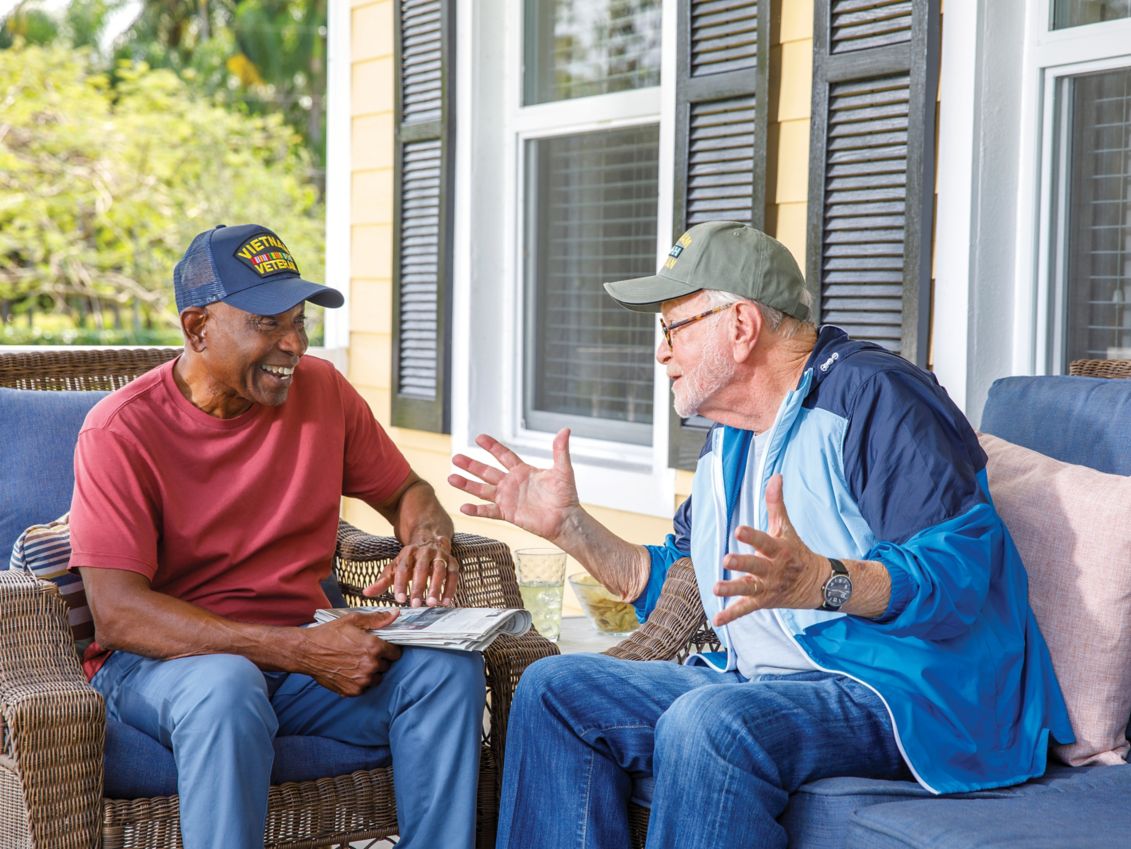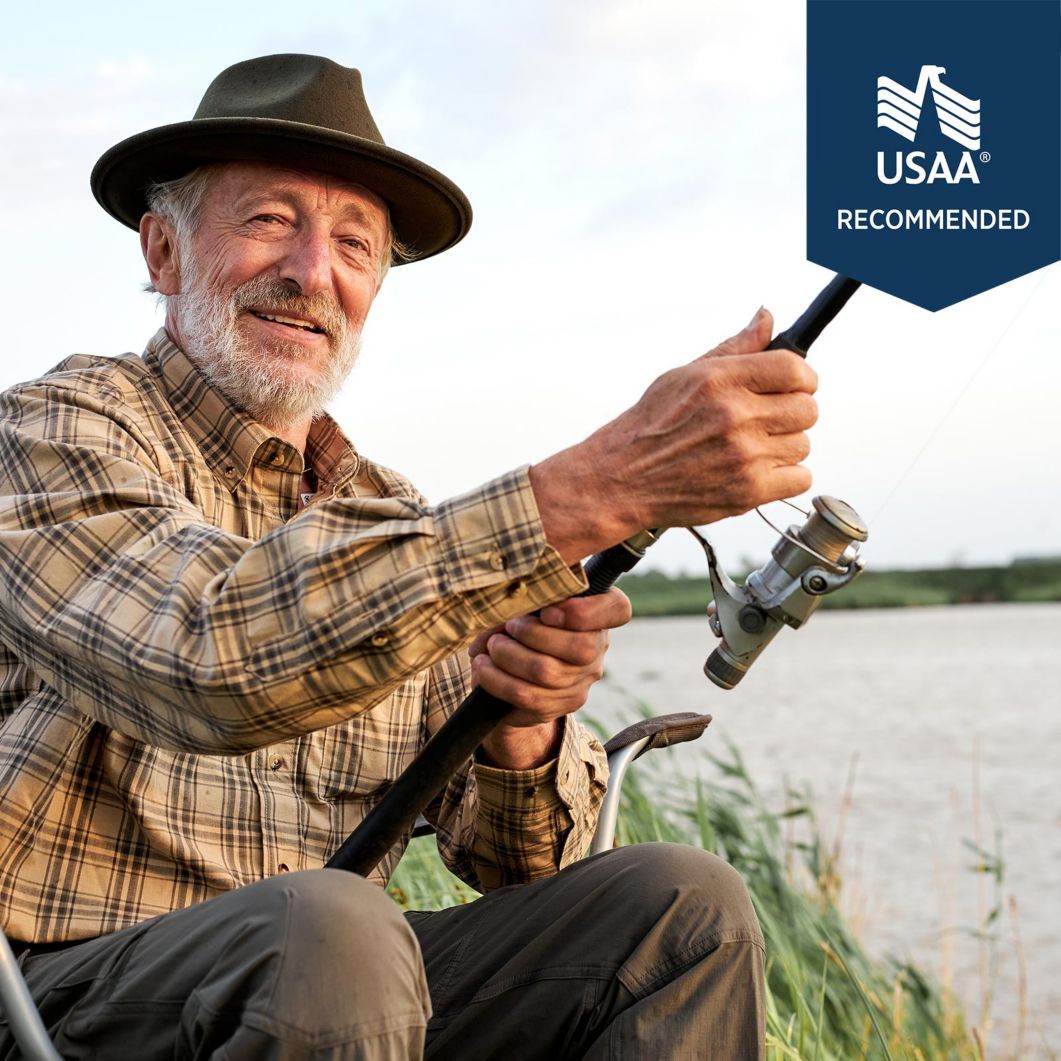A Humana Medicare Advantage (MA) plan doesn’t replace your Veterans Affairs (VA) coverage—it complements it. MA plans can offer you more benefits, affordable costs and options for care closer to home—including plans with $0 premiums and
Medicare Advantage plans and veterans’ benefits

Humana cares about your emotional health. If you’re a veteran in crisis or concerned about one, dial 988 and press 1 to get 24/7 confidential support from the Veterans Crisis Line

Humana Honor® plans
We’re proud that USAA® recommends all Humana Medicare Advantage plans, including the portfolio of Humana Honor® plans. These plans are available to anyone eligible for Medicare, including veterans’ spouses, but they’re designed with veterans in mind.
As veterans transition from military to civilian life, there's a role for society to play. There's also a role for Humana, as we partner with these veteran-focused organizations to ensure that our veterans have access to all the Care that they need.
The veterans’ benefits landscape can be incredibly complicated, especially for transitioning service members who may have never needed to access their earned benefits before. What the VFW and our Global Network of Advocates does is we provide representation throughout the process, help explain to veterans what they need to know about their earned benefits, what they may qualify for, and then walk them through that process.
It's a lot like going into a big city without a road map, going into the claims system, so our service officers are that road map. We're doing what we can in partnership with Humana to make sure that, hey, let's get the message out there that there are avenues for you to turn to, there are places for you to go to talk to people and get assistance.
When a veteran comes to one of our service officers they're usually there because of a chronic health condition or some other unmet need. And so when our Advocates are meeting with veterans, it's critical that they can identify things like food insecurity, access to health care issues, or even stable housing or potential family and relationship issues. These are all predictive factors for suicide, homelessness, other crises in their life.
But when you partner with someone like Humana who understands the healthcare needs and concerns like they do to help push the message even further and broaden the reach that we have, it makes a significant impact in the community.
At Humana we are committed to whole-person health. And what that means in particular for our veterans is to ensure that they are not only getting the medical care that they need but that we're really focused also on their behavioral health needs. We're very concerned about the risk that veterans have for suicide, and so we're focused on good mental health or behavioral health needs, clinical health needs, as well as addressing the social determinants of health that contribute to overall well-being.
We do suicide prevention online training where you can actually go through this program and learn how to talk to someone about suicide. When I am doing events out in the community and saying, hey, I am focusing on veteran suicide and Humana jumps on board, that just gives me a boost of confidence that I can continue to create other programs that's going to help veterans.
Veterans have done so much to serve our country that they deserve to have the best health possible. And so Humana is committed to helping them achieve their best health through not only ensuring they get the right clinical medical care but ensuring that we can try to help them remove these social health barriers one at a time.
Beyond what Humana has brought to the table for helping to train our service officers, Humana and its veterans' network specifically bring resources to our communities to better reach veterans and better address those social determinants of health. What our service officers provide is just one facet of that. We can help steer a veteran toward economic stability, stable housing, even access to Healthcare through VA, but there are other things that we can't address. And that's really where Humana has stepped up to the plate to make sure that there are reliable resources for veterans.
Our veterans have given so much to our country. Through these partnerships we hope to give back by ensuring that our veterans have access to all the services that they deserve.
Get a Medicare Advantage plan designed with veterans in mind
It's the best of both worlds. Humana's USAA Honor and USAA Honor with Rx plans are available to anyone eligible for Medicare and may be a good fit for Veteran beneficiaries because they offer more choices for care and coverage beyond VA benefits. Enjoy the flexibility of choosing between VA healthcare providers or civilian doctors, pharmacies and specialists in your Medicare Advantage plan’s network to maximize the scope of your total coverage and benefits.
How would you like to get started?
Shop online
Enter your ZIP code below to see the Humana plans available in your area.
Call us
Licensed Humana sales agents can help daily, 8 a.m. – 8 p.m.
1-888-204-4062 (TTY: 711)
Source
- “Our Commitment to Military & Veterans
opens in new window ,” Humana, last accessed August 7, 2025.